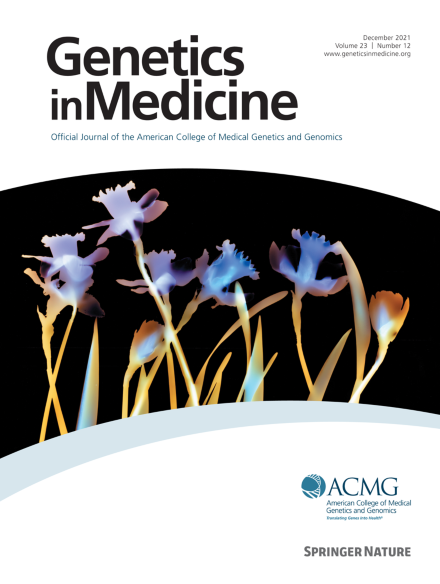Optimizing participant and community engagement in cancer genomic sequencing research
IF 6.2
1区 医学
Q1 GENETICS & HEREDITY
引用次数: 0
Abstract
Purpose
We describe strategies implemented across research centers of the Participant Engagement and Cancer Genome Sequencing (PE-CGS) Network to optimize engagement of participants and communities in cancer genomics research. We also present consensus definitions of engagement and engagement optimization, informed by our shared experiences in the Network.
Methods
Key informant interviews and a document review identified engagement and optimization strategies across PE-CGS research centers. Findings were synthesized using qualitative content analysis. Consensus on definitions of engagement and optimization were developed through iterative review by PE-CGS members.
Results
PE-CGS research centers adopted tailored strategies based on community needs and scientific gaps. Engagement strategies included community-based efforts (eg, advisory boards and newsletters) and participant-focused approaches (eg, enhanced informed consent and decision support tools). Optimization strategies leveraged scientific methods (eg, randomized controlled trials and surveys) to evaluate engagement. Engagement was described as the sustained and meaningful interactions between researchers, participants, and communities. Optimization was described as the application of scientific methods to refine and improve engagement and research processes and outcomes.
Conclusion
Engagement and optimization strategies have informed research planning, conduct, and dissemination across PE-CGS. These approaches and definitions provide a foundation for developing evidence-based practices to strengthen participant and community involvement in cancer genomics research.
优化参与者和社区参与癌症基因组测序研究。
目的:我们描述了参与者参与和癌症基因组测序(PE-CGS)网络研究中心实施的策略,以优化参与者和社区在癌症基因组学研究中的参与。根据我们在网络上的共同经验,我们还提出了参与和参与优化的共识定义。方法:主要信息提供者访谈和文献回顾确定了PE-CGS研究中心的参与和优化策略。采用定性含量分析对研究结果进行综合。通过PE-CGS成员的反复审查,对参与和优化的定义达成了共识。结果:PE-CGS研究中心根据社区需求和科学差距采取了有针对性的策略。参与战略包括以社区为基础的努力(例如,咨询委员会、通讯)和以参与者为中心的方法(例如,加强知情同意、决策支持工具)。优化策略利用科学方法(如随机对照试验、调查)来评估用户粘性。参与被描述为研究人员、参与者和社区之间持续而有意义的互动。优化被描述为科学方法的应用,以完善和改善参与和研究过程和结果。结论:参与和优化策略为PE-CGS的研究规划、实施和传播提供了信息。这些方法和定义为发展基于证据的实践提供了基础,以加强参与者和社区对癌症基因组学研究的参与。
本文章由计算机程序翻译,如有差异,请以英文原文为准。
求助全文
约1分钟内获得全文
求助全文
来源期刊

Genetics in Medicine
医学-遗传学
CiteScore
15.20
自引率
6.80%
发文量
857
审稿时长
1.3 weeks
期刊介绍:
Genetics in Medicine (GIM) is the official journal of the American College of Medical Genetics and Genomics. The journal''s mission is to enhance the knowledge, understanding, and practice of medical genetics and genomics through publications in clinical and laboratory genetics and genomics, including ethical, legal, and social issues as well as public health.
GIM encourages research that combats racism, includes diverse populations and is written by authors from diverse and underrepresented backgrounds.
 求助内容:
求助内容: 应助结果提醒方式:
应助结果提醒方式:


